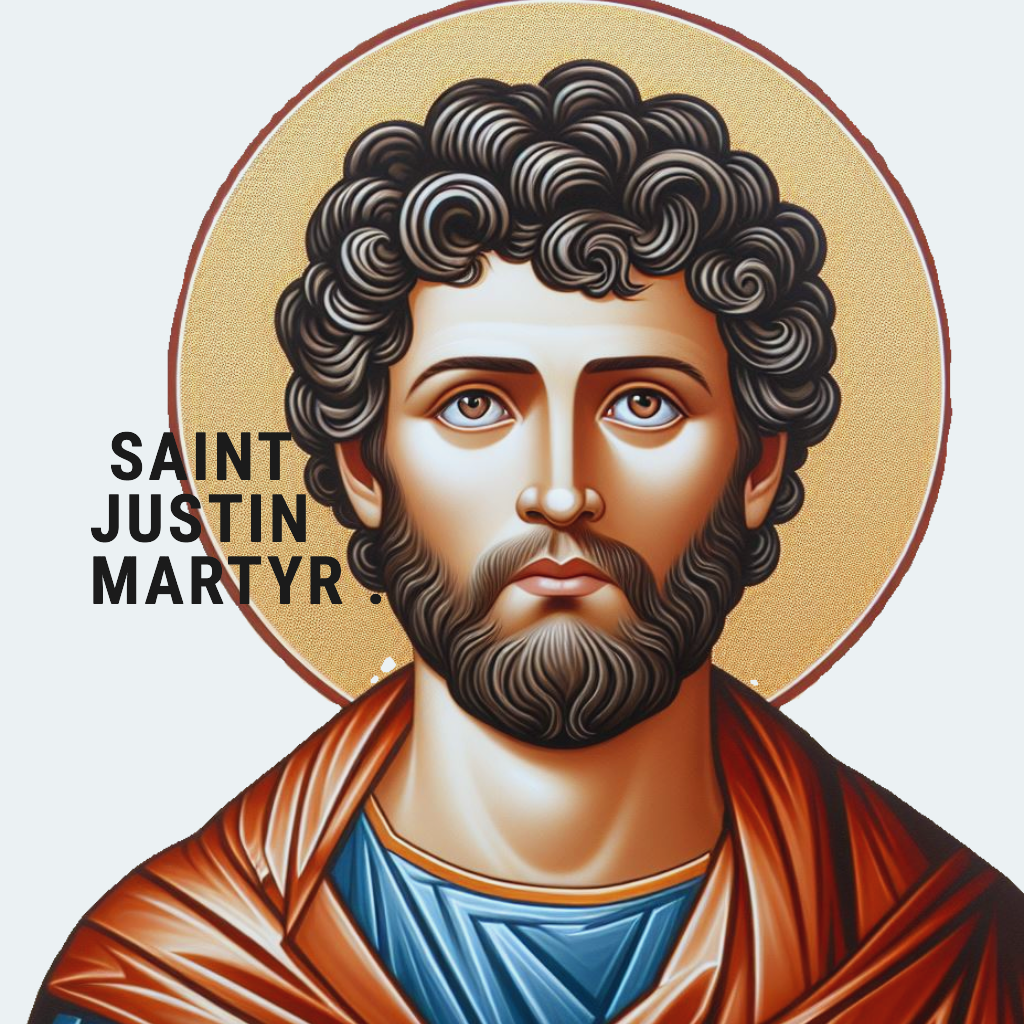
Quick facts
Born: c. 100-Flavia Neapolis, Palestine
Died: c. 165- Rome, Italy
Feast Day: June 1st
Paton saint of philosophers, lecturers, and apologists.
Background
St. Justin was born in ancient Palestine to a family of Greek heritage. Justin, a pagan convert to Christianity in his early 30s, is known for many things including being a great lecturer, philosopher, and early Christian apologist. These are things for which he has become a patron saint. It is believed that in the year 165, St. Justin was martyred after his apologetic defenses against Crescens the Cynic. Crescens reported to Roman authorities that St. Justin and his followers were atheists (of pagan gods). St. Justin and some of his students were then killed by beheading, as evidenced by authentic records of the execution.
St. Justin’s Conversion
What we know about St. Justin’s life demonstrates that he had an intellectual conversion to the faith. He was well educated. In his work, Dialogue with Trypho, he describes many of the schools of philosophy that he studied under different philosophical teachers. These teachers included a: Stoic, Peripatetic, Pythagorean, and a Platonist. He found the most merit in learning from the Platonist teacher. St. Justin had a strong yearning for the truth and believed that Platonism would lead him there. In the second chapter of Dialogue with Trypho, St. Justin describes philosophy as one of the greatest tools given to man as a way to understand God. However, he suggests, that rather than continuing as one subject philosophy, over time, philosophy became a “many-headed” creature of sorts. He was stating that the philosophers of his day lost philosophy’s original purpose, which was to learn about and know God.
In later chapters of Dialogue with Trypho, St. Justin describes an encounter with an unnamed “Old Man,” who was one of the early Christians of his time. Through their conversation, St. Justin experiences the start of his conversion. The Old Man and St. Justin speak about philosophy, but the elderly man impresses upon Justin that the wisdom of the prophets far surpasses the wisdom given to the world by philosophers:
“There existed, long before this time, certain men more ancient than all those who are esteemed philosophers, both righteous and beloved by God, who spoke by the Divine Spirit, and foretold events which would take place, and which are now taking place. They are called prophets. These alone both saw and announced the truth to men, neither reverencing nor fearing any man, not influenced by a desire for glory, but speaking those things alone which they saw and which they heard, being filled with the Holy Spirit. Their writings are still extant, and he who has read them is very much helped in his knowledge of the beginning and end of things, and of those matters which the philosopher ought to know, provided he has believed them (Dialogue with Trypho, Chapter 6).”
This conversation affects St. Justin deeply and sets off his new life as a Christian. Modern Christians can learn many things by analyzing the works left behind to us by St. Justin. For example, the mention of Old Testament writings above demonstrates the importance of reading scripture, for God’s written word can reveal to us more than any philosophy can.
St. Justin on the Eucharist and Other Early Church Practices.
St. Justin also touches on early Christian beliefs and traditions that the Catholic church still holds today. Nowadays, God’s true presence in the Eucharist is a frequently debated subject. Many protestant Christians only view Jesus’ statement at the Last Supper: “Take, eat; this is my body” (Matthew 26:26) as symbolic. However, the Catholic and even the Orthodox view is that Christ is truly present in the Eucharist. This is how St. Justin portrayed belief in the Eucharist:
And this food is called among us Εὐχαριστία [the Eucharist], of which no one is allowed to partake but the man who believes that the things which we teach are true, and who has been washed with the washing that is for the remission of sins, and unto regeneration, and who is so living as Christ has enjoined. For not as common bread and common drink do we receive these; but in like manner as Jesus Christ our Saviour, having been made flesh by the Word of God, had both flesh and blood for our salvation, so likewise have we been taught that the food which is blessed by the prayer of His word, and from which our blood and flesh by transmutation are nourished, is the flesh and blood of that Jesus who was made flesh. For the apostles, in the memoirs composed by them, which are called Gospels, have thus delivered unto us what was enjoined upon them; that Jesus took bread, and when He had given thanks, said, This do in remembrance of Me, Luke 22:19 this is My body; and that, after the same manner, having taken the cup and given thanks, He said, This is My blood; and gave it to them alone (The First Apology, Chapter 66).
Additionally, St. Justin commentates in his apologies on other Christian practices to educate non-Christians on what they believed. Some of these practices include baptism, the process of the mass, deacons administering communion, and distribution of communion to the sick and homebound. Through St. Justin’s writing, we can have confidence in knowing that the way we conduct our faith now is the same as how it was conducted 2000 years ago.
Finally, one last take away from St. Justin is that he was regarded not only for his intelligence as a philosopher, but also as a martyr and respected for his courage in dying for the faith. He is one of the saints regarded as philosopher martyr.
Fun Fact: St. Justin Martyr is one of the patron saints of this website. St. Justin Martyr, please pray for Catholic Vagabond. Amen!
Sources
Dialogue with Trypho: https://www.newadvent.org/fathers/0128.htm
First Apology: https://www.newadvent.org/fathers/0126.htm
Augustine Institute: https://youtu.be/jCXK2A_39u8?si=Qnp8PUpu0N6skp1x